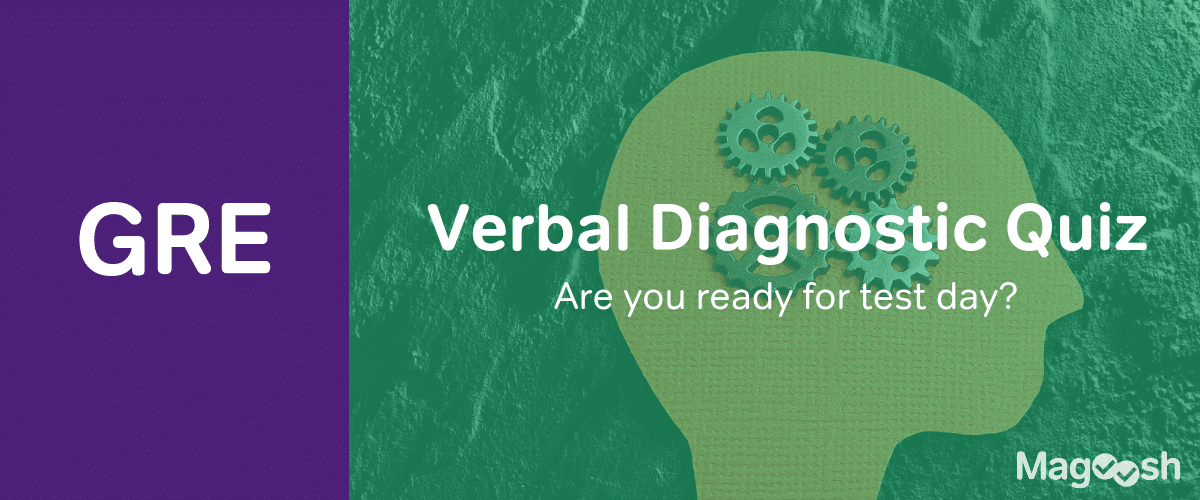I’ve said it before, but I’ll say it again, only because many publishers continue using really difficult and obscure words that will not be tested: the new GRE is not a test of vocabulary; it is a test of context recognition. You will be rewarded for analytical skills, not so much for memorization. Many of the really difficult words that students crammed (aleatory, bootless, etc.) are not going to be on the test.
At the same time, there will still be some difficult words on the test. But, if you are not confident that you are going to score in the higher range, i.e. move on to the difficult verbal section, then you shouldn’t really worry about the words below.
And I think it is important that I preface this – if you are looking for about a 600 on the verbal section (based on the old scale) then you will be squandering precious study time if you treat every word on the word list the same. Simply put, some words are more likely to show up than others. Again, the words below are more difficult GRE words. Every so often, I’ll include these posts, just so the higher verbal scorers will have some lexical food for thought.
Sententious
This word looks like it would relate to a sentence. If you know the GRE, you will know this is probably not the case, as the GRE is likely to subvert people’s gut reaction. Sententious means to be moralizing, usually in a pompous sense.
The old man, casting his nose up in the air at the group of adolescents, intoned sententiously, “Youth is wasted on the young.”
Propitiate
If somebody is really angry, and you want to make them less angry, then you attempt to placate or appease them. Or, if you like really big GRE words, then you propitiate them.
The two sons, plying their angry father with cheesy neckties for Christmas, were hardly able to propitiate him – the father already had a drawer full of ones he had never worn before or ever planned to.
Feckless
Feck, probably for its phonetic similarity to another word, has been dropped from the language. That or the lexicographers have become feckless, which means that they lacked the drive or initiative to include feck in the dictionary. Feckless means lazy and irresponsible. So, don’t get feckless and drop the –less, lest somebody totally misinterprets you. In which case, you’ll have to do a fair amount of propitiating.
By the way, I’m feckless– I won’t an include an example sentence.
Tendentious
If you are likely to espouse a controversial view, you are being tendentious. A good synonym for tendentious is biased, though biased doesn’t necessarily relate to a controversial view.
Because political mudslinging has become a staple of the 24-hour media cycle, most of us, despite proclamations to the contrary, are tendentious on many of today’s pressing issues.
Limpid
This word does not relate to limp, it relates to clarity in terms of expression. Limpid is typically used to describe writing or music.
Her limpid prose made even the most recondite subjects accessible to all.
Takeaways
Some GRE words, such as the ones above, will typically be found only on the most difficult of the Verbal sections. Unless you are aiming for this level, do not feel you have to learn these words. Spend time, instead, learning words that typically pop up in “essential GRE words” type lists.






Comments
4 responses to “Difficult GRE Vocabulary”
Hey Chris,
Thanks for this post.
If my target score is at least a 600 on the verbal section, how many words would you recommend to remember the “context” of?
Many thanks,
Mark
Hi Mark,
Well, the answer to that question depends on a few things. First off, where are you now, roughly speaking, in terms of your verbal score? If you are looking to increase your verbal score by 250 points, then you would have to learn far more words than if you were looking to boost your verbal score by 100 points.
Overall, I would do your best to learn words in context that you struggle with or that are vague. Words that have a straightforward definition or are a simple synonym for another word, you can learn using flashcards.
For instance, the word extol means to praise highly. That seems to be a pretty straightforward definition. I would still encourage you look it up to see how it is used. But learning that word from a vocabulary list makes sense. I would recommend doing the same for laud, a closely related word. Both extol and laud basically mean to praise highly (that laud usually implies a public context is trivial).
More vague words like confer (to grant a benefit or right to) is a word that you really have to see in context to get a strong sense of.
Again, it is important, regardless of your level, not to only learn from flashcards, but to learn from articles you are reading. As to what that exact number of word is, it is difficult to say. But if you learn close to thousands words over the course of your studying, I would say that should help you hit your target score (Again, learn doesn’t just mean flashcard regurgitation).
Good luck, and let me know if you have any more questions!
Thanks for the reply,
I’m glad you brought up flash cards, I’m two weeks into studying for the GRE and have learned about 300 new words using the method. I took some verbal practice tests and found that even when I knew the word most words, I was still getting them wrong. I took your advice on a previous blog about getting Word Smart… and I’m glad I did. I find myself looking through it more often now, especially after memorizing new words, not only does it provide alternative meanings, but it also provide sentences for the words, which I find extremely helpful.
You mentioned reading articles… do you know where I can find such articles without having to pay? Maybe a link?
Also I wanted your feedback on a a group of GRE words I found online: http://www.satvocab.com/vocabulary-lists/baron-kaplan-gre-wordlist/
Thanks for all the great help Chris,
Mark
Hi Mark,
Yes, Word Smart is definitely the way to go on vocabulary. As for articles, I wrote some posts awhile back that I think you will find helpful:
https://magoosh.com/gre/2019/best-and-worst-gre-word-lists/
https://magoosh.com/gre/2011/vocabulary-in-context-the-new-york-times-the-economist-the-atlantic-monthly-and-the-new-yorker/
As for the the satvocab link you sent me, the words are all high-frequency words. However, the format, a long alphabetical list is pretty tedious. Instead go to quizlet.com, where you can make your own flashcards. Quizlet also has barrons and kaplans (and the other usual suspects) pre-bundled in flashcard form so you are ready to go!